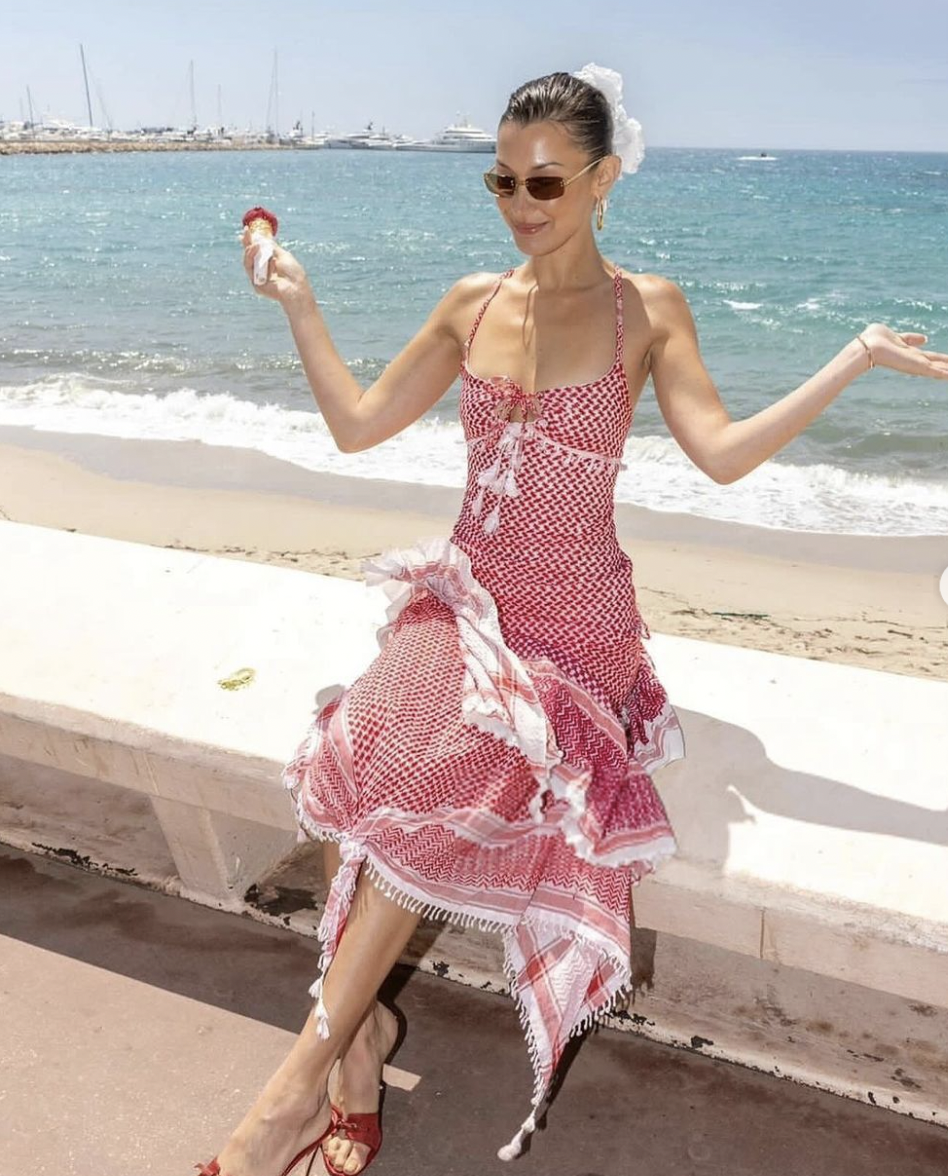
Life&Style Writer Ruby Green weighs in on whether making a fashion statement can be as impactful as other forms of protest
By now, you should have seen celebrities walking the red carpet and appearing at press events wearing a red Artists4Ceasefire pin to show their support for a ceasefire amongst the ongoing Israel-Palestine conflict. The Artists4Ceasefire collective aims to ‘amplify the global call for an immediate and permanent ceasefire’ through the power and platforms of these artists. The Artsist4Ceasefire pins have been present across award ceremonies, including the Oscars and the BAFTAs.
Nicola Coughlan has been a prominent figure in this movement, as she consistently wears her pin at every Bridgerton press tour event and has raised $1.2 million for Palestine Children’s Relief Fund through social media.
Whilst the Artists4Ceasefire pins have been significant in using red carpets and celebrity status to draw attention to the call for a ceasefire, the Cannes Film Festival saw a step up in the merging of humanitarian statements and fashion.
Bella Hadid, an American model with Palestinian heritage, was photographed out in Cannes during the Cannes Film festival wearing a dress that resembled a keffiyeh. A keffiyeh is a headdress traditionally worn by Arab men that has become a political symbol of solidarity and support for Palestine.
“it is undeniable that this is a planned political statement from the model due to her Palestinian heritage
Whilst Hadid’s dress is not strictly a traditional Palestinian keffiyeh, it is undeniable that this is a planned political statement from the model due to her Palestinian heritage and previous outward support for Palestine. The dress itself is a 2001 archive piece by designers Michael & Hushi. Hushidar Mortezaie, one of the designers, explained on Instagram that although the dress is not specifically a Palestinian keffiyeh, ‘this dress was made 23 years ago and everyone from the region was grouped as one big Other’ and expressed hope to ‘stand in unity and love against genocide’.
Australian actor, Cate Blanchett, wore a Jean Paul Gaultier dress to the premier of The Apprentice at the 2024 Cannes film Festival. The front of the dress was black, and the back was a light pink, however, when Blanchett lifted the skirt in a certain position for photos, the bright green underside was exposed. When combined with the red of the carpet and the flash of photographers, a Palestinian flag motif became clear. Blanchett has previously shown her support for a ceasefire by signing an open letter to President Biden, so whilst Blanchett has not confirmed whether the pro-Palestine fashion statement was intentional, we can safely speculate that it was.
Amongst Bella Hadid and Cate Blanchett were other stars that used their fashion at Cannes Film Festival to show their support for Palestine. Kani Kusruti, an Indian actor, sported a watermelon handbag with her outfit – a symbol that has come to represent Palestine through the similarity to the Palestinian flag colours. Pascale Kann, a French actor, wore a top with ‘Palestine’ inscribed in Arabic on it by Trashy Clothing – a Palestinian label. Additionally, French actors, Leila Bekhti Bastien Bouillon, and Australian actor Guy Pearce showed their support through pro-Palestine pins on their outfits.
“would it not make more of a statement, ruffle more feathers, and be a more impactful protest if the celebrities boycotted the events altogether?
With all these public figures using fashion to show their support for Palestine it begs the question is it enough? Celebrities using their moment in the spotlight as a form of protest to highlight social and political issues is a certainly good thing as it captures attention and takes the issues mainstream in popular culture. However, would it not make more of a statement, ruffle more feathers, and be a more impactful protest if the celebrities boycotted the events altogether?
It is estimated that the Cannes Film Festival brings in approximately $33 million through a combination of public funds, attendance fees, market fees, sponsorships, and direct subsidies from The City of Cannes. The sponsorships from L’Oreal and Chopard alone were around $6.9 million this year. That amount of money in the hands of charities, like Save The Children, Palestine Children’s Relief Fund, and The United Nations Relief and Works Agency for Palestine Refugees (UNRWA), would be life changing. So how much applause should we really be giving these celebrity political fashion statements?
“with the platforms that celebrities have, they know their voices and their decisions will have influence and impact
This is not to say that using fashion to protest humanitarian issues in exclusive and elite spaces, with eyes and cameras everywhere, is a performative move, especially considering the vocal efforts both Bella Hadid and Cate Blanchett have made to speak out in support of Palestine and against the genocide. With the platforms that celebrities have, they know their voices and their decisions will have influence and impact, which makes these statements important. However, it is difficult to overlook the money that would have been spent on the Haider Ackermann for Jean Paul Gaultier dress and the Louis Vuitton necklace used to make this statement. That amount of money could save lives in Gaza.
Read more from Life&Style:
TikTok ‘Brain Rot’: How TikTok Is Changing The Way Gen Z Speaks
Comments